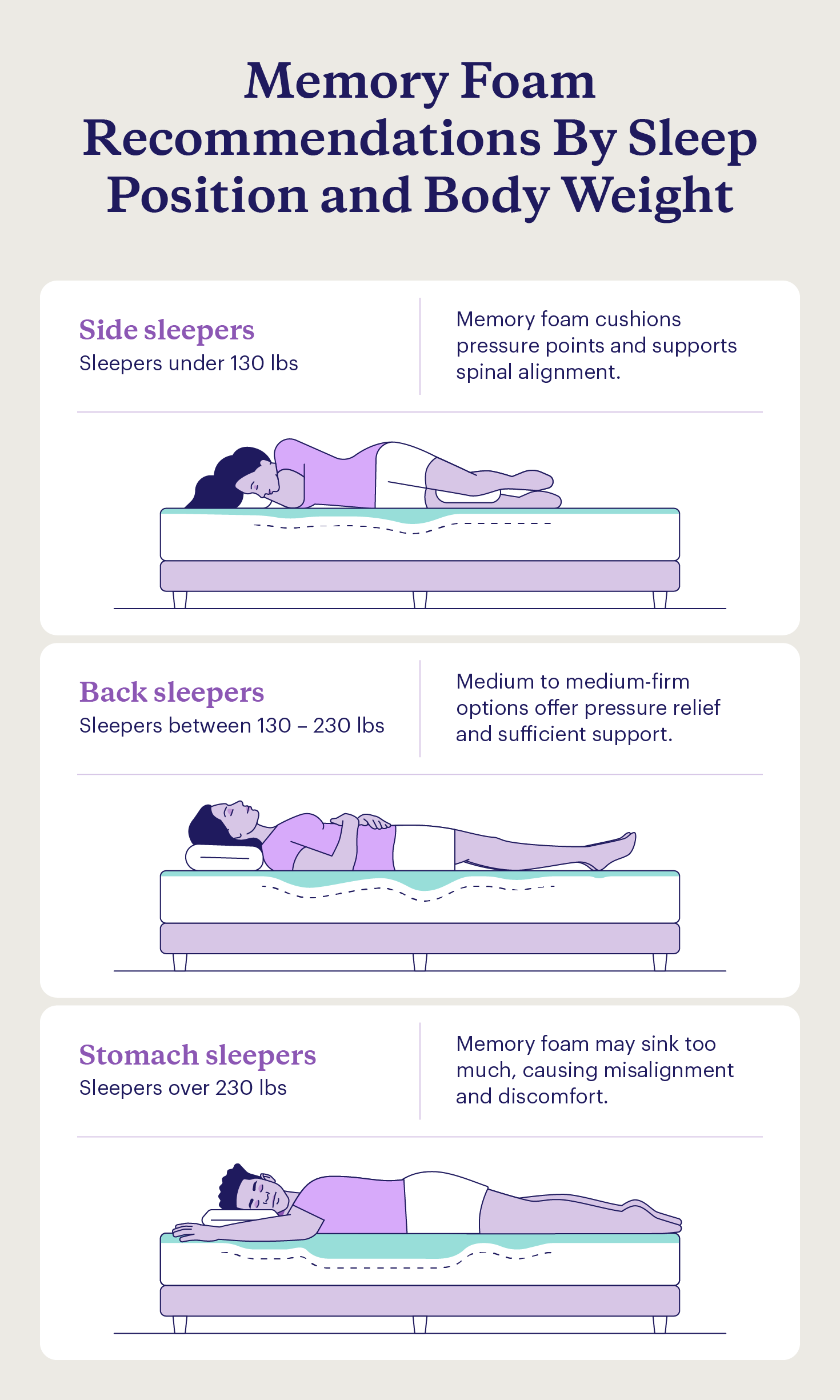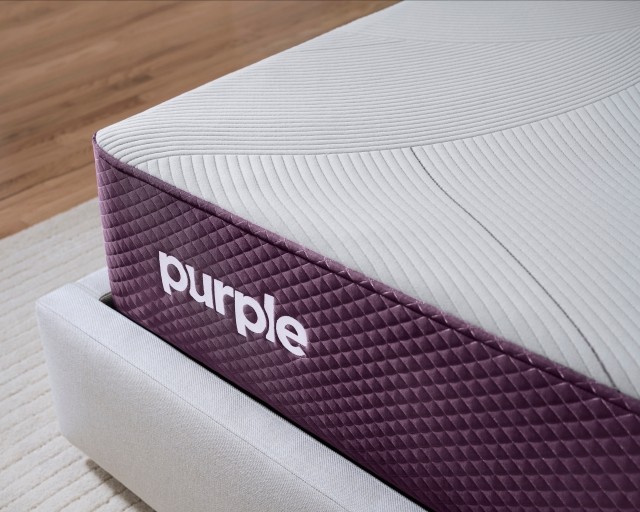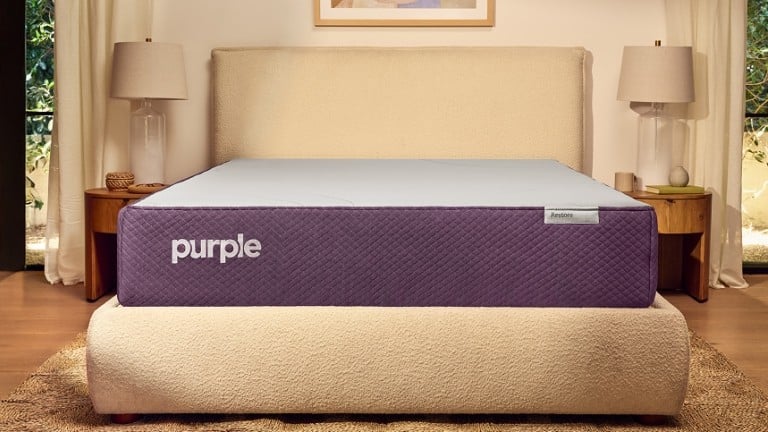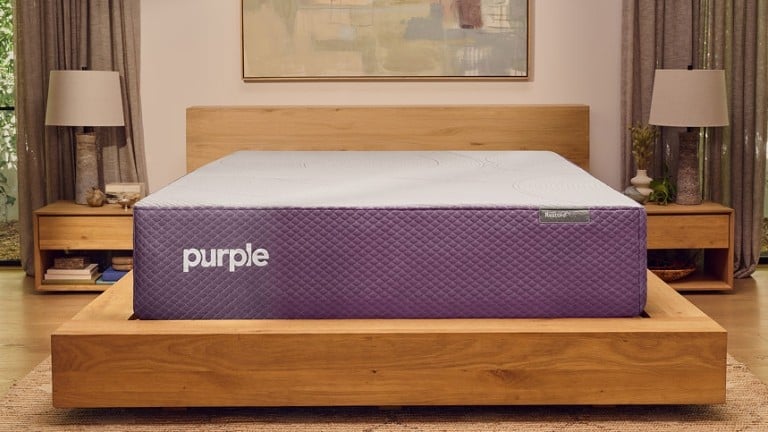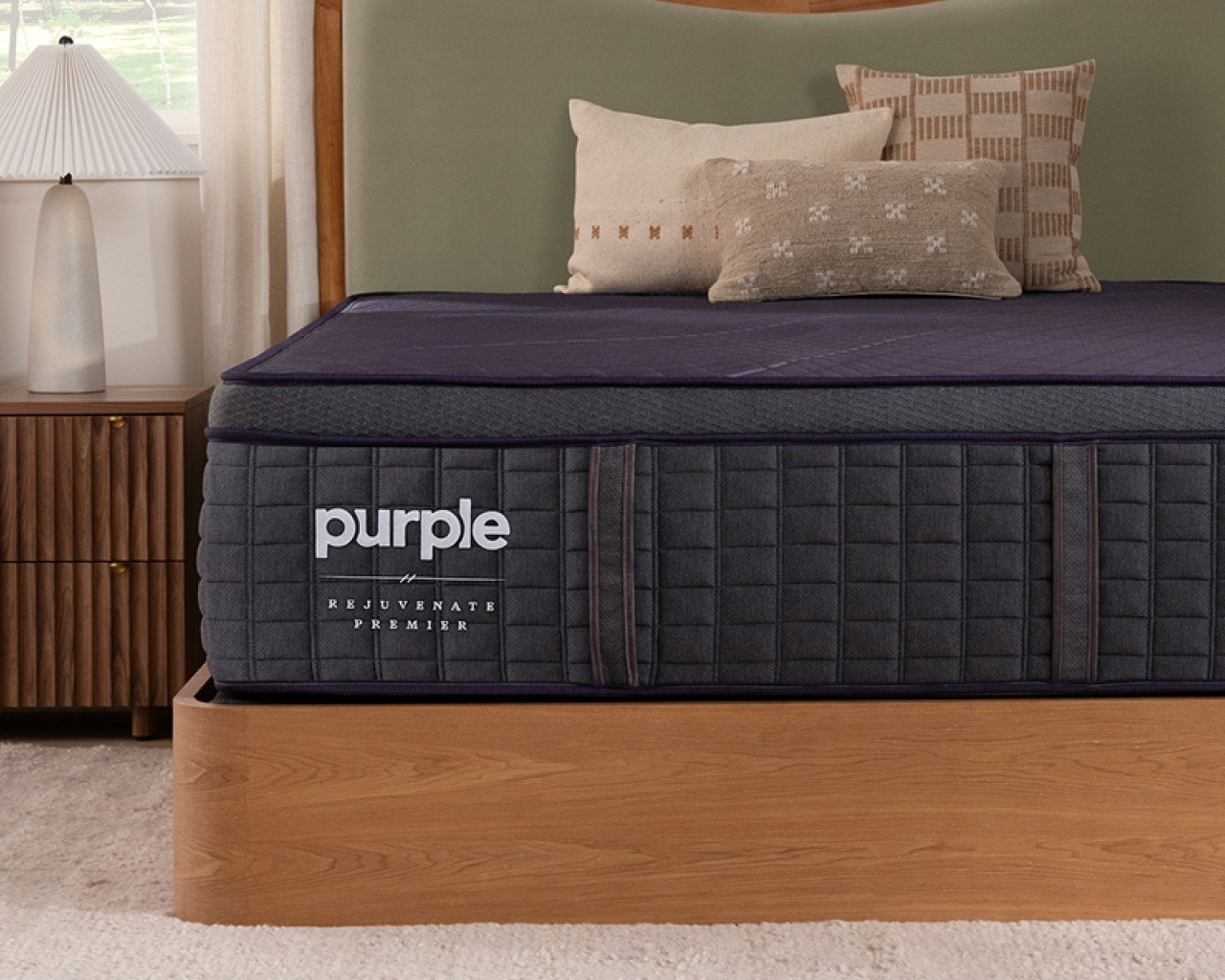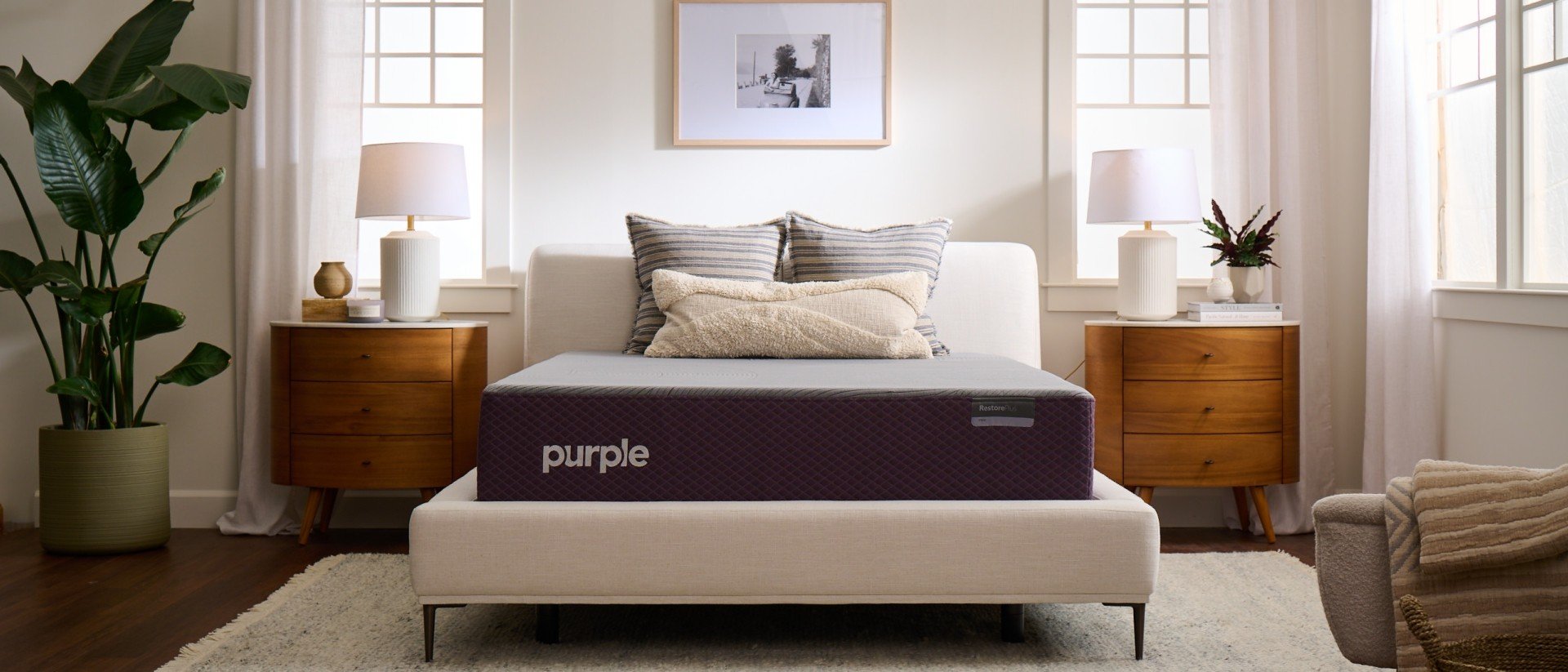
Is Memory Foam Bad for Your Back? Pros + Cons Guide
Is memory foam good for your back?
Memory foam isn't inherently bad for your back, but a lack of sufficient support and excessive sinkage may cause back pain. Choosing a high-quality memory foam mattress or an alternative that offers the benefits of memory foam can help mitigate that risk.
When it comes to memory foam, there's a common misconception: Is memory foam bad for your back? While the foam itself doesn't cause back pain, the support and firmness of the mattress you choose may contribute to the issue. Research suggests that certain levels of mattress firmness can promote comfort and sleep quality.1
Memory foam is designed to provide support for the natural curve of the spine and cushion joints, making it a common choice for people with back pain. That said, choosing the best mattress for back support depends on a few factors.
While memory foam responds slowly and only with the application of warmth from your body, Purple mattresses leverage our proprietary GelFlex Grid® technology and responsive coils to instantly adapt to your body shape and cradle your pressure points, providing optimal support for spinal alignment.
Why Memory Foam May Cause Back Pain
While memory foam itself has no direct correlation with back pain, it may not be the most comfortable or supportive option for all sleepers.
Memory foam mattresses are a good choice for some people, but even the most well-suited mattress can contribute to discomfort depending on your sleeping position, the bed foundation, and the firmness of the mattress you choose.
Wrong Firmness Level
Memory foam mattresses come in different firmness options. Be sure to select a firmness level that is firm or soft enough for your body weight, sleeping position, and personal preferences. An incompatible firmness can actually worsen your discomfort.
- Too soft: Without enough support, you'll sink too deeply into your mattress, which may make your back arch uncomfortably, reducing spinal support and putting more pressure on the lumbar region.
- Too firm: A rigid mattress won't allow your body to sink into it properly, causing your back muscles to strain while adjusting to the feel, which can cause discomfort, especially for side sleepers.
Insufficient Weight Support
Mattress feel and firmness aren't universal. Your body weight can affect how comfortable your mattress feels.
- Lightweight sleepers: Soft mattresses may feel firmer under a lightweight sleeper, as their bodies won't compress the mattress as much, and firmer mattresses may feel too hard, causing discomfort.
- Average weight sleepers: Most average sleepers — especially back sleepers — are often encouraged to choose medium-firm mattresses, which can offer balanced support and comfort.
- Heavier sleepers: Under a heavier individual, soft mattresses may be too soft, putting additional strain on pressure points and causing misalignment. Firmer mattresses may provide more support for a heavier sleeper, offering sufficient structure and pressure relief.
Incompatible Sleep Position
Everyone prefers different sleeping positions, which play a role in either reducing or contributing to back discomfort.
The most common sleep positions include:
- Stomach sleeping: This position is often considered the one most likely to cause back and neck pain by causing the head and neck to lie in awkward positions, regardless of the mattress you're using.
- Back sleeping: In general, sleeping on your back is considered one of the best positions to support spinal alignment. Back sleepers need a mattress that adequately supports the curve of the spine and relieves discomfort from the hips and shoulders; memory foam mattresses may allow their bodies to sink too much.
- Side sleeping: A memory foam mattress is a fine choice for a range of sleepers, but it may be an especially good fit for side sleepers. The way it cradles pressure points in the shoulders and hips can reduce the risk of discomfort.
Poor Foundation
A bed frame can contribute to back pain if it doesn't adequately support the mattress, and can even cause sagging and uneven wear. Insufficient support can even harm high-quality mattresses, making it seem as though the mattress is the problem when in reality, it's the bed's foundation.
That said, memory foam mattresses go well with adjustable bed bases, platform bases, or flat foundations, but are a poor match for box springs.
Longer Adjustment Period
New mattresses can cause back discomfort during the adjustment period. When you first start using a memory foam mattress, it may feel different from what you expect. The adjustment period may lead to some temporary discomfort or back pain. But as your body gets used to the new sleeping surface, its firmness, and how it reacts to your shape, the discomfort should fade.
This adjustment period varies from person to person, but it can take up to a month for your mattress to adapt to your body. During this period, make sure your sleep habits aren't making the discomfort worse.
Memory Foam vs. GelFlex Grid®
Despite the potential downsides, memory foam mattresses have been a popular option for good reason, though there are plenty of alternatives like the GelFlex Grid®, which is found in all Purple mattresses, that offer the advantages without the drawbacks.
Contoured Support
Memory foam conforms to your body, which can promote neutral spinal alignment for back or side sleepers, while Purple mattresses instantly adapt to your body as you move, regardless of your preferred sleep position, to provide full-body support where you need it most.
Pressure Relief
By distributing your body weight, memory foam mattresses can reduce discomfort by relieving pressure from your shoulders, hips, and lower back. If a memory foam mattress sinks too much under your body, it can put additional pressure on sensitive joints, causing discomfort.
The GelFlex Grid® cradles your pressure points while supporting the broad surfaces of your body, providing ample pressure relief and keeping your spine aligned.
Motion Isolation
For those who share a bed, memory foam is excellent at isolating motion, so you’re less likely to feel someone tossing and turning. Likewise, the GelFlex Grid® minimizes motion transfer, providing support, pressure relief, and a responsive sleep surface without disrupting your rest.
Responsiveness
Since memory foam tends to absorb movement as your body slowly sinks into it, the material tends to be one of the least responsive options, making it less ideal for sleepers who shift overnight as well as those who struggle with mobility.
A better mattress for seniors, combination sleepers, and anyone who doesn’t want to feel trapped by their mattress would be a GelFlex Grid® mattress. The GelFlex Grid® adapts as you move, facilitating movement so you can get comfortable and get out of bed just as easily.
Heat Retention
Memory foam is known to trap heat, which can make them uncomfortable for couples and anyone who sleeps hot. Even gel memory foam, which is designed to be more cooling, can still create a trapped feeling that results in discomfort.
Comparatively, the GelFlex Grid® features over 1,400 individual air channels, allowing heat to dissipate more quickly to keep you cooler while you sleep.
Pros and Cons of Memory Foam
Memory foam is most known for its distinctive slow sinking sensation that your body melts into. These mattresses can provide consistent support and softness that may help improve comfort and sleep quality. At the same time, their firmness, weight, and heat retention may cause issues for some people and affect the likelihood of back pain.
It's important to weigh the pros and cons to understand whether a memory foam mattress would work for you.
Pros | Cons |
Provides ample pressure relief | Heat retention can cause discomfort and restlessness |
Contours to your body | Sinking feeling may not appeal to all sleepers |
High-quality options are durable | Weight and maneuverability creates logistical challenges |
May be made with hypoallergenic materials | Maintenance and care can be more demanding than alternatives |
Often minimizes motion transfer | Initial firmness may make the adjustment period uncomfortable |
Should You Get a Hybrid or Memory Foam Mattress for Back Pain?
If relieving discomfort is your top priority, memory foam can provide the support and pressure relief you need — but it's not your only option.
Hybrid mattresses incorporate cushioning materials like memory foam alongside coil systems to provide extra comfort, added bounce, and better airflow, making them a great option for people who sleep hot. Because of their design, hybrid mattresses may help relieve discomfort from conditions like sciatica while sleeping.
If the downsides of an all-foam mattress outweigh the benefits, you might opt for a hybrid mattress with memory foam or a similar comfort layer. Since hybrid mattresses tend to promote better airflow and offer more structured support, you can take advantage of the contoured pressure relief of memory foam with less heat retention and fewer concerns about premature sagging.
Memory foam | Hybrid | |
Pressure relief | Distributes weight to relieve pressure | Comfort layers cushion pressure points |
Contouring | Designed to cradle your body | Depends on comfort layers |
Support | Stability of foam layers varies by density | Coil structure offers structure and durability |
Temperature | Can trap heat and contribute to sleeping hot | Promotes better airflow through coils |
Motion isolation | Absorbs motion for minimal disturbances | Varies based on comfort layers and coil structure |
Purple's Restore Hybrid Collection utilizes comfort foam in addition to our proprietary GelFlex Grid® technology that adapts to your body's shape and cradles pressure points for enhanced comfort, regardless of your sleeping position.
How To Find the Best Mattresses for Back Pain
Now that you know how memory foam can be good or bad for your back, it's time to make a checklist of all the details to consider before choosing a mattress to buy. Make sure you keep details such as body weight, movement, and sleeping positions in mind while browsing.
- Prioritize support: Make sure your mattress provides the support you need. If you feel as though you sink too deep into your mattress, look for something with more support. If your mattress has felt rigid and unyielding, try a softer option.
- Look for pressure relief: If you're waking up with back pain, you need to make sure your new mattress offers pressure point relief to reduce tension and help distribute your weight evenly.
- Consider density: Denser memory foam mattresses tend to offer better support, last longer, and resist compression more efficiently.
- Opt for comfort: The definition of "comfort" varies from person to person. Your mattress needs to be easy to fall asleep in. It should fit your usual position and support your body so that the risk of back pain and discomfort is reduced.
Understanding what your sleep needs are can narrow down mattress options and make the choice simpler.
Purple mattresses can address your needs, prioritizing spinal alignment and different levels of support. Our mattresses can accommodate different sleeping positions and help reduce the chance of pain or discomfort, allowing you to sleep more comfortably with fewer disruptions.
FAQ
No, memory foam itself does not cause back pain. The reality is that the supportiveness of the mattress, your sleeping position, the quality of your bed frame, and the adjustment period are all factors that may contribute to back pain.
Memory foam is a heat-retaining material, which means you might feel warm at night. It's also initially firm when first purchased, but that changes over time. It feels as though you're sinking into it, so it may not be ideal for people who like a consistently firm surface while they sleep.
It's not bad to sleep on memory foam so long as the mattress’ support suits your sleep style. Not all memory foam mattresses have the same level of firmness, so make sure you pick the right one for your body.
It's likely too firm or too soft for you. If you bought it recently, it's also possible that both you and the mattress are still adjusting. Make sure to also check your bed frame and verify if it's supporting the mattress well or if it's causing unevenness.
If you still have backaches after you've tried stretching before bed, adjusting your sleep position, and swapping out your base, it may be time to shop for a new mattress.
More To Explore
Level up your sleep routine with our most-loved products.



